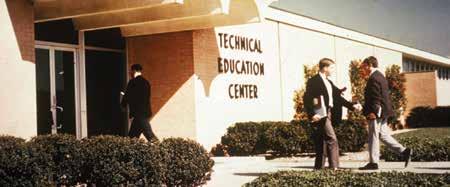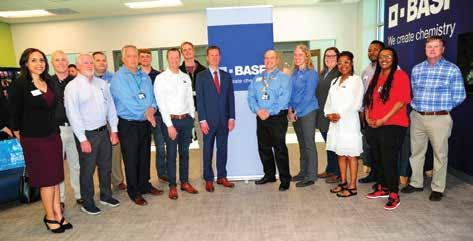
4 minute read
and Success
A Great Example of Partnership and Success
BASF, TCTC and Apprenticeship Carolina joined with other community partners at the Oconee Campus March 1 to celebrate the first completers of the educational component of the BASF North American Apprenticeship Development Program and to welcome the second cohort.
Last summer seven TCTC students joined the BASF team as apprentices who pursued a TCTC credential and Department of Labor credentials while also earning a full-time wage through onthe-job training at the company’s Seneca plant.
This collaboration is a partnership between BASF, TCTC and Apprenticeship Carolina.
The twelve-month apprenticeship program pays apprentices a full-time wage and full benefits to participate in on-the-job training at BASF’s Seneca facility while earning a certificate in Process Technology from Tri-County. At the end of the program, apprentices have the skills and credentials to be placed in permanent positions at BASF’s Seneca site.
In addition to paying a competitive wage, BASF offers medical, dental, vision, vacation and other benefits and covers the cost of tuition, books and fees associated with the certificate program.
“This is a great example of partnership and success,” said TCTC President Galen DeHay.
“We couldn’t do this without the partnership with TCTC and Apprenticeship Carolina,” said BASF Seneca Operations Manager Dave Sanders. “This partnership is so important because it provides people with no prior experience in manufacturing with the tools they need to explore and find success in the manufacturing industry.”
We have been successful in attracting new, diverse talent through this program, and we are looking forward to a continued collaboration,” added BASF Senior Vice President of Precious Metal Services Tim Ingle.
“Innovative, collaborative programs of this type are a unique solution to the challenges of workforce recruitment and development. By closely working with our business partners to understand their workforce needs, Tri-County continues its tradition of building strong communities of skilled workers who create value for their employers while starting successful careers,” said Bryan Manuel, dean of Integrated Workforce Solutions at TCTC. (continued on page 19)
The first cohort of BASF’s apprenticeship development program poses with President DeHay, center, and BASF representatives. President DeHay, right, talks with Elba Lizardi, BASF site director, and Tim Ingle, BASF senior vice president, precious metal services.
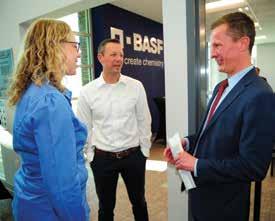
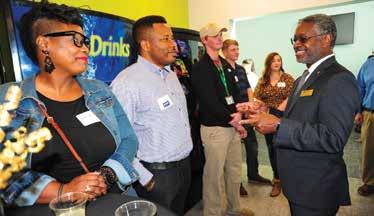
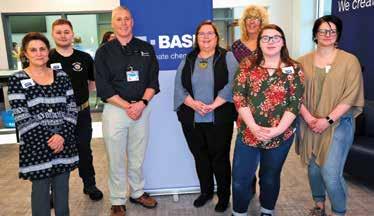
Dr. Anthony Guiseppi-Elie, TCTC vice president of academic affairs and workforce development, talks to first cohort Victor Ikenna Odor. The second apprenticeship cohort poses with BASF representatives.
The History of Tri-County Technical College
The greatest single resource that South Carolina has with which to attract industry is its people. Experience has shown that industrial prospects are primarily interested in the nature and caliber of their prospective employees.
This was the conclusion drawn by a subcommittee of the South Carolina General Assembly back in 1961 after being tasked with studying the needs of the state development board on the subject of technical training.
Their findings prompted the birth of a system of 16 technical colleges in South Carolina. Created as tools for economic development, the colleges were charged with preparing the state’s greatest resource—its people—for employment.
One year later, Tri-County was founded in 1962 when the area leaders pooled their resources to plan the College after Act 323, Section 23, of the South Carolina General Assembly established the S.C. Committee for Technical Education and provided for the establishment of regional centers.
As South Carolina’s Governor, Ernest (Fritz) Hollings signed Act 905 of the General Assembly on April 7, 1962, creating what would eventually become Tri-County Technical College.
Senator Hollings is recognized as the father of South Carolina’s system of technical education. He is credited with opening the door to higher education in 1962 for thousands of South Carolinians who wouldn’t have had this opportunity without the creation of the state’s system of 16 technical colleges.
Senators J.B. Lawton of Anderson County, Marshall Parker of Oconee County, and Earle Morris of Pickens County, joined Senator John C. West of Kershaw County, representative of the state committee, to request funds from the General Assembly for the original funding of $500,000 for Tri-County. Their efforts were successful, and construction began on a hilltop donated by Clemson University approximately two miles south of Clemson on Highway 76 in Pendleton. Pickens Hall was the first building on the site.
Tri-County Technical Education Center became operational in the fall of 1963. It was located on a 23-acre tract of land, donated by Clemson University on Highway 76 in Pendleton. The classroom/laboratory/administration building contained 42,000 square feet of floor space.
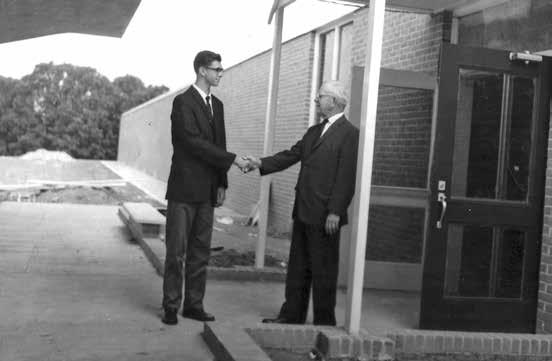
The Technical Education Center (TEC) opened September 10, 1963, with Bill Yarborough as director. It attracted 919 students during its first year of operation. The curricula included electronics technology, machine tool, welding, and other engineering technologies. Hughie Dewitt Collins, of Mountain Rest, pictured at left, was the first student to enroll. Aubrey Marshall, founding chairman of the Area Commission, welcomed him.
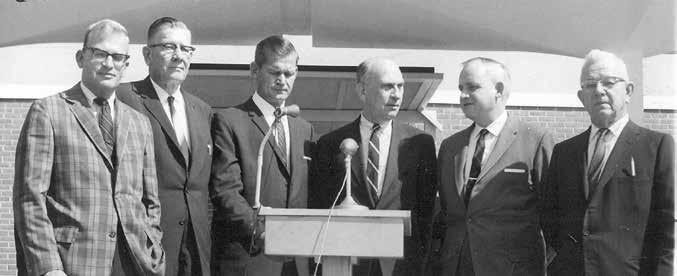
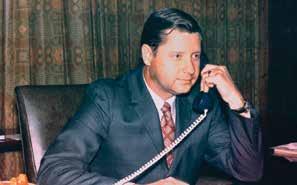
above: The founders of Tri-County Technical College: Senator Earle Morris, Pickens County; Senator J.B. Lawton, Anderson County; Senator Marshall Parker, Oconee County; Senator Donald Russell; Senator John West; and founding Chairman Aubrey Marshall above, right: Bill Yarborough, first director of TCTC right: Technical Education Center, 1960s
